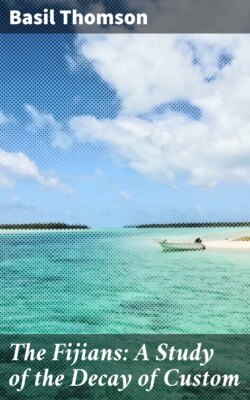Читать книгу The Fijians: A Study of the Decay of Custom - Thomson Basil - Страница 7
На сайте Литреса книга снята с продажи.
THE TRANSITION
ОглавлениеTable of Contents
The Fijian of to-day is neither savage nor civilized. Security from violence has fostered his natural improvidence. The missionaries, who have effected so marvellous a change in his moral and religious sentiments, who have induced him to join in the suppression of such customs as polygamy, cannibalism, strangling of widows, amputating the finger as a mark of mourning, dressing the hair in heathen fashion, wearing the loin bandage, tattooing and many others, have neglected to teach him to care for his health and his physical well-being. They have taught him to cultivate his mind rather than his food plantation, and they have given him no immediate punishment for thriftlessness and disobedience to take the place of the old club law. He was accustomed to be ruled by a strong hand because no other rule was possible, and he is suffering from the fact that civilization was not forced upon him. If, instead of being ceded, the country had been conquered and each man relegated to his place with a strong hand, the dawn of settled government would have been less bleak.
Having never known the struggle for existence that prevails in the crowded communities of the old world, he was spurred into activity by the fear of annihilation, for upon his alertness his existence depended. Intertribal wars conquered the natural indolence and apathy of the people, but, with the bestowal of the pax Britannica this impulse failed. The earth yielded all they required for their simple wants, and they were free to indulge their natural indolence. They lack the alertness of races who have to contend against savage animals, from which the Fiji islands are free, and they have none of the steady application of those who must compete with others for their daily bread.
Yet, in being thriftless and apathetic, they are but obeying a natural law which the modern state socialist is too apt to minimize if not to ignore. Without the necessity for a struggle between man and man or man and Nature there has never been any progress. Society must stagnate or slip backwards without the spur of ambition or of fear; the natural bent of all men is to be idle. The old world Paradise was a garden that yielded its fruit without cultivation; the old world punishment for disobedience was the decree that man should earn his bread by the sweat of his brow. Industry and thrift are hardly to be looked for in a luxurious climate among a sparse population, but rather among those races whose climate and soil yield food only at stated seasons of the year, and then grudgingly in return for unremitting labour, or in those crowded communities whose local supply of food is insufficient. When we blame the Fijians for their thriftlessness we are prone to judge them by too high a standard, and to forget that they are land-owning peasants, a class which even among ourselves is exempt from the grinding necessity of perpetual toil—a state that has come to be regarded as the natural lot of the poor. The primitive organization of village communities among whom the tie of individual property is loose and ill-defined enough to please the most advanced socialist, causes thrift to be regarded as a vice, and wasteful prodigality the highest virtue.
